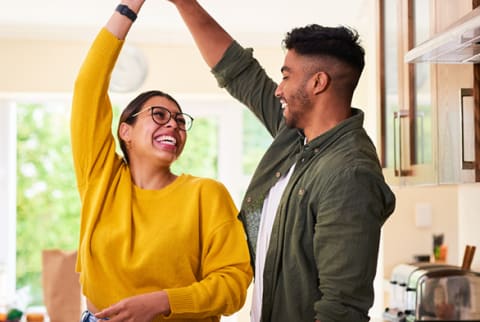Advertisement
Partner Dancing Can Reduce Dementia — Here's Why, From A Psychiatrist


You wear sunscreen to protect your skin. You consume probiotic-rich foods to feed your gut. You keep vitamin C on hand to boost your immune system—but what are you actively doing to protect your brain?
While we can't overlook proper nutrition and the power of a regular sleep schedule, there's one exercise functional medicine psychiatrist Kat Toups, M.D., deemed superior on an episode of the mindbodygreen podcast. Here's what you need to know.
Can dancing reduce dementia?
Don't worry, you don't have to run a marathon or lift heavy weights to train your brain (unless you want to, of course). Rather, consider adding dancing to your workout routine. In fact, Toups says this simple exercise can even be a helpful therapy method for those with dementia (in addition to those trying to prevent it). And she's certainly an expert on the subject: She published a dementia study this past summer (along with neurologist Dale Bredesen, M.D., who we've also had on the show), in which 84% of patients with mild cognitive impairment saw improvement after only nine months.
But back to the exercise at hand: "Dancing, in particular tango dancing, can be very helpful for people with dementia," Toups says. One factor influencing this correlation is the fact that tango is a partner's dance. "It gives you another level of brain stimulation," she says.
She even references a study that assessed the impact of a 12-week, 20-lesson Argentine Tango course. Researchers measured plasma inflammatory markers, cognition, and motor and psychosocial performance in middle-aged women at increased risk for Alzheimer's by virtue of parental history. The results? "Participants in tango demonstrated improvements in whole-body spatial cognition and short-term and working memory, and reduced deterioration of executive function1," researchers report.
Of course, movement in general is great for your brain, but tango and other partner dances feed on social connection as well. "We know that being socially connected is something that actually facilitates more longevity and better aging," Toups adds. And social isolation, for what it's worth, has been associated with a higher risk of developing dementia.
Other ways to protect your brain
While this may be one reason to grab your partner, friend, or family member and head to a dance class, it's certainly not the only way to strengthen your brain.
Any type of movement, be it walking, Pilates, strength training, or playing sports, is great for your overall health—your brain health included.
Proper nutrition can also play a role, as well as brain-healthy eating plans like the Mediterranean diet.
If you want to take your routine a step further, you may even consider adding a brain supplement to your routine.
Don't know where to start? Check out our 16 favorite brain supplements for memory, mood balance, and cognitive function, all backed by a nutrition Ph.D.
The takeaway
While brain health may not always be top of mind (pun intended), it's critical to tend to your brain function to encourage better memory, no matter your age. One way to do so is by dancing, especially if that dance involves a partner. It's never too late to strengthen your brain health, and it may be as easy as signing up for a dance class.